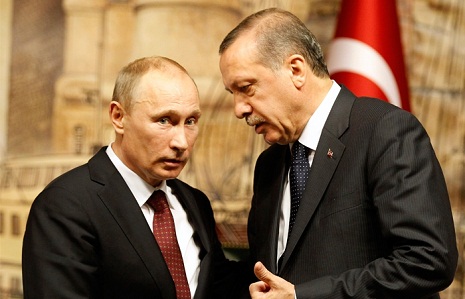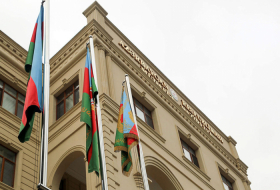Reva Bhalla: Hello my name is Reva Bhalla and today I`m joined by Eurasia Analyst Lili Bayer to discuss the increasing friction we`ve noticed between two major Eurasian players, Russia and Turkey. So Lili today we learned that the Turkish Foreign Minister Cavusoglu is going to be headed to Washington on the 18th. And this occurs against the backdrop of a number of interesting Turkish visits across the region. What have you observed so far? What have the Turks been up to?
Lili Bayer: So the Turks have choosing to travel to some very interesting places. Between late March and early April we saw the Turkish President Erdogan as well as his foreign minister travel to Romania, Moldova, Lithuania, Slovakia and Slovenia. So a lot of countries right along NATO`s eastern edge. We also saw the U.S. Assistant Secretary of State Nuland traveling to Turkey. And although we don`t know what kinds of meetings she`s holding, this is a very significant time to be there.
Reva: Yes certainly, Nuland especially, given her Russia focus and we know that she always tends to meets with interesting people in these countries. It`s been a very quiet visit so far. But we talk a lot about at Stratfor about the concept of the Intermarium, this alliance along the European rim and on Russia`s frontier. And Turkey is essential to that because you’ve been tracking a number of countries within the Intermarium who have been very active, Poland, Romania. Turkey though is that southern anchor, so what do you think the read is as the Poles, the Romanians, the Lithuanians, what are they thinking in looking at Turkey right now? Is Turkey a credible player in this alliance?
Lili: Well the Poles and the Romanians especially have been looking to Turkey because Turkey is right there on the southern edge of the Black Sea. It controls the entrance to the sea. So from a Russian military strategic perspective, having an alliance or at least some kind of understanding with Turkey is essential for their naval power. And so for other Black Sea countries, like Romania and Bulgaria, assuring that Turkey remains a committed and involved member of NATO is crucial. And we saw meetings between the Romanian and Turkish leadership. We saw the Polish foreign minister a few weeks ago traveling to Turkey. So they`re definitely involved.
Reva: And we`ve seen the Turks also participate in Black Sea exercises alongside the Romanians as well as the Bulgarians. Now obviously all of this is very unnerving to Russia. And Russia has kind of played a careful game with Turkey. They`ve avoided stepping on each other`s toes for a very long time in the Caucasus and any overlapping spheres of influence in Europe. But we see that starting to shift just a bit. And maybe a symbolic interpretation of that is just what`s going with the anniversaries that we have in both Turkey and Armenia. So what`s happening on the Russian side to show its displeasure with the Turks?
Lili: So originally President Vladimir Putin was scheduled to go to Armenia for the 100-year commemoration of the Armenian genocide. But what happened was that over the past few weeks we saw some tensions between Russia and Turkey kind of come into the fore, especially over the treatment of Crimean Tatars. The Turkish foreign minister publicly criticized Russia for shutting down a Crimean Tatar television station which was an odd statement to make because in the past Turkey and Russia have kept their disagreements rather quiet, preferring to negotiate rather than bring their disagreements to the public. So these tensions have actually caused the Kremlin to change its position on Putin`s attendance at the Armenian commemorations. Right now, the position of Putin`s spokesperson is that they are considering attending, which is actually different than what he was saying a few weeks ago.
Reva: Yeah I mean the assumption was that Putin himself was going to be there with the Kardashians and everything else. But now they are just going to send a high level official. So that`s one sign, but one of many. Now energy is a really important dynamic here. The Turkish energy relationship with Russia, obviously the Turks depend on the Russians for a large bulk of their energy needs, but the natural gas relationship in particular is really critical. So how have you seen the energy dynamic shift between Russia and Turkey?
Lili: So we have seen a shift, especially over the past months. In the past Turkey has paid a relatively high price for Russian natural gas imports because it didn`t really have a lot of alternatives. But what we`ve seen over the last few weeks is Turkey really staring to take a strong position in its negotiations with Russia. So when President Putin visited Turkey back in December, he promised that they were going to negotiate over a discount. And he mentioned the number 6 percent. But what we have seen is Turkey pushing for a higher and higher discount and Russia not really relenting. So right now, there is no agreement over discount, and the Turks keep pushing.
Reva: And obviously a big part of the conversation between Russia and Turkey is also Turkish Stream, which in my opinion it seems that Turkey is sort of playing along with the Russians on that project. And the Russians are basically trying to make sure that Turkish Stream is not taken as a joke. But as we know financing is still the big, big question that Russia or Turkey can really answer at this point.
Lili: Absolutely. Turkish Stream is a big symbolic project right now for the Kremlin, but at this point it doesn`t seem like it`s realistic financially. But one other thing we have to consider is that Turkey is not only a player around the Black Sea but also in the Middle East. And we have seen an evolution in its role in the Middle East. So how do you see Turkey`s role changing right now?
Reva: It`s interesting. So just as we saw Turkey sort of sitting on the sidelines in Europe right while the Poles and the Romanians and the Lithuanians were taking the lead, and now maybe Turkey is going to get more involved. In the Middle East you kind of see a similar situation, where within this broader Sunni alliance that Saudi Arabia has really taken the lead on, and you see an active conflict in Yemen as one case study, Turkey has still been on the sidelines of that. They haven’t been the leader that they`ve wanted to be in this region. They`ve just lacked the following. And so I think that`s overall going to push Turkey into a more active role in the Middle East. And it`ll have to differentiate its policy from Saudi Arabia. Obviously there are different ideological differences there as well when it comes to what types of groups and factions it wants to support. But stepping back I think we see a very interesting Turkey starting to come to light. And this is something I know Stratfor has been waiting for a very long time. And when we look at the strategic picture, the U.S.-Turkish relationship is going to be a very important one to watch. Obviously this is not the Turkey of the 1950s. It is a Turkey with a different outlook toward the region. Different ideological preferences and things like that. But structurally, Turkey belongs in this broader alliance, one way or the other. So I know your work is going to be very important in tracking just how much Turkey migrates within this alliance. And of course we have to watch how the Russians react. So thank you Lili for watching this closely. And thank you all for joining us today.
More about:
















































